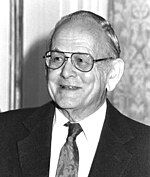
Back غاريت هاردين Arabic جاريت هاردين ARZ قارت هاردین AZB Garrett Hardin Catalan Garrett Hardin Czech Garrett Hardin German Garrett Hardin Spanish گارت هاردین Persian Garrett Hardin Finnish Garrett Hardin French
Garrett Hardin | |
|---|---|
 Garrett Hardin (1986) | |
| Born | Garrett James Hardin April 21, 1915 Dallas, Texas, U.S. |
| Died | September 14, 2003 (aged 88) |
| Alma mater | University of Chicago (BS) Stanford University (PhD) |
| Known for | "The Tragedy of the Commons" (essay) |
| Scientific career | |
| Fields | Ecology |
Garrett James Hardin (April 21, 1915 – September 14, 2003) was an American ecologist and microbiologist. He focused his career on the issue of human overpopulation, and is best known for his exposition of the tragedy of the commons in a 1968 paper of the same title in Science,[1][2][3] which called attention to "the damage that innocent actions by individuals can inflict on the environment".[4] He is also known for Hardin's First Law of Human Ecology: "We can never do merely one thing. Any intrusion into nature has numerous effects, many of which are unpredictable."[5][6]: 112
Hardin held hardline anti-immigrant positions as well as positions on eugenics and multiethnicism that have led multiple sources to label him a white nationalist. The Southern Poverty Law Center described his publications as "frank in their racism and quasi-fascist ethnonationalism".[7][8][9][10][11]
- ^ Cite error: The named reference
tragedywas invoked but never defined (see the help page). - ^ Locher, Fabien (August 19, 2013). "Cold War Pastures: Garrett Hardin and the 'Tragedy of the Commons'". Revue d'Histoire Moderne et Contemporaine. 60 (1): 7–36. doi:10.3917/rhmc.601.0007. ISSN 0048-8003.
- ^ "Debunking the Tragedy of the Commons". CNRS News. French National Center for Scientific Research. January 5, 2018. Retrieved November 29, 2022.
In December 1968, the American biologist Garrett Hardin (1915–2003) published one of the most influential articles in the history of environmental thought. ... The concept was soon being widely cited in academic circles, as well as by journalists, ecologists, government authorities and politicians. Many saw it as a scientific justification for the state control or (more often) the privatization of resources and ecosystems. Today, our historical perspective and improved understanding show this line of thinking for what it is: a misconception with no concrete basis, skewed by a highly ideological perception of social systems.
- ^ Cite error: The named reference
NYTobitwas invoked but never defined (see the help page). - ^ Hardin, Garrett (1963). "Hardin, Garrett. "The cybernetics of competition: A biologist's view of society". Perspectives in Biology and Medicine. 7 (1): 80. doi:10.1353/pbm.1963.0034. PMID 14070000. S2CID 9236063. Retrieved December 14, 2020.
- ^ Cite error: The named reference
Miller1993was invoked but never defined (see the help page). - ^ Biss, Eula (June 8, 2022). "The Theft of the Commons". The New Yorker. Retrieved June 13, 2022.
- ^ "Garrett Hardin". Southern Poverty Law Center. Retrieved July 20, 2018.
- ^ Mildenberger, Matto (April 23, 2019). "The tragedy of the tragedy of the commons". Scientific American Blog Network. Retrieved July 22, 2020.
- ^ Abegglen, Martin (September 26, 2019). "First as Tragedy, Then as Fascism". The Baffler.
- ^ Nijhuis, Michelle (May 4, 2021). "The miracle of the commons". Aeon.
© MMXXIII Rich X Search. We shall prevail. All rights reserved. Rich X Search